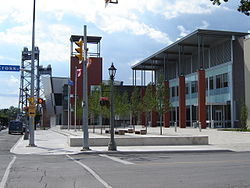Welland, Ontario
| Welland | ||
|---|---|---|
| City (lower-tier) | ||
| City of Welland | ||

The Welland Civic Square
|
||
|
||
| Nickname(s): The Rose City | ||
| Motto: Where Rails and Water Meet | ||
 Location of Welland in the Niagara Region |
||
| Location in southern Ontario | ||
| Coordinates: 42°59′N 79°14′W / 42.983°N 79.233°WCoordinates: 42°59′N 79°14′W / 42.983°N 79.233°W | ||
| Country |
|
|
| Province |
|
|
| Region | Niagara | |
| Settled | 1788 | |
| Incorporated | 1858 (village) | |
| 1917 (city) | ||
| Government | ||
| • Mayor | Frank Campion | |
| • Governing body | Welland City Council | |
| • MP | Vance Badawey | |
| • MPP | Cindy Forster | |
| Area | ||
| • Land | 81.09 km2 (31.31 sq mi) | |
| Elevation | 175.30 m (575.13 ft) | |
| Population (2011) | ||
| • Total | 50,631 | |
| • Density | 624.4/km2 (1,617/sq mi) | |
| Time zone | Eastern (EST) (UTC−5) | |
| • Summer (DST) | EDT (UTC−4) | |
| Postal code FSA | L3B, L3C, L0S | |
| Area code(s) | 905 / 289 / 365 | |
| Highways |
|
|
| Website | welland |
|
Welland (2011 population 50,631) is a city in the Regional Municipality of Niagara in Southern Ontario, Canada.
The city is in the centre of Niagara. Within a half-hour, residents can travel to Niagara Falls, Niagara-On-The-Lake, St. Catharines, Port Colborne and Buffalo. It has been traditionally known as the place where rails and water meet, referring to the railways from Buffalo to Toronto and Southwestern Ontario, and the waterways of Welland Canal and Welland River, which played a great role in the city's development. The city is separated by the Welland River and Welland Canal which links Lake Erie and Lake Ontario.
Welland is the home of C Company of The Lincoln and Welland Regiment which is part of 32 Canadian Brigade Group, the classification of this unit is Light Infantry.
Welland's nickname is The Rose City.
The city was settled in 1788 by the United Empire Loyalists. On 19 October 1814, Canadian forces led by George Hay, 8th Marquess of Tweeddale, met an American raiding party, numbering approximately nine hundred, near the eastern edge of the present community during the Battle of Cook's Mills. After an intense skirmish, the Americans retreated to Buffalo, New York. Cook's Mills was the second to last engagement of the War of 1812 on Canadian soil.
...
Wikipedia


